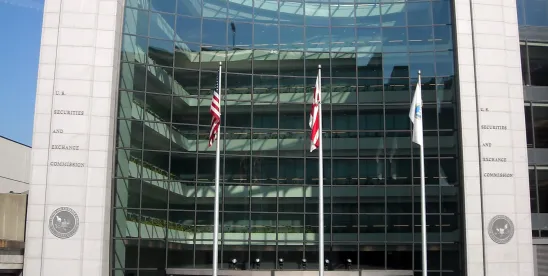On September 25, 2024, the Securities and Exchange Commission (the SEC) announced that it had instituted and settled enforcement actions under Section 13(d), Section 13(g) and Section 16(a) of the Securities Exchange Act of 1934 (as amended, the Exchange Act). The actions involved 21 individuals and entities that allegedly had failed to timely file Schedule 13D or 13G to report beneficial ownership of greater than 5% of the registered equity securities outstanding and/or amendments to such reports, and/or to timely file Form 3, 4 or 5 to report ownership of, and transactions in, registered equity securities by executive officers, directors and greater-than-10% beneficial owners (collectively, insiders). As part of the settlements, individual respondents agreed to pay civil monetary penalties ranging from $10,000 to $200,000, and entities agreed to pay civil penalties ranging from $40,000 to $750,000. As part of the same set of settlements, the SEC also instituted and settled two enforcement actions against public companies for allegedly causing certain of their insiders’ Form 3, 4 or 5 filing failures or for failing to report such filing delinquencies. Just a week earlier, the SEC had announced the institution and settlement of enforcement actions under Section 13(f) and Section 13(h) of the Exchange Act against 11 institutional investment managers that allegedly had failed on a timely basis to file one or more quarterly Form 13F reports and/or periodic Form 13H reports.
The Bottom Line
The foregoing actions are part of an SEC enforcement initiative aimed at ensuring compliance with ownership disclosure and other reporting rules. Insofar as the beneficial ownership and insider actions are concerned, the most recent set of settlements suggest a possible willingness on the SEC’s part to bring enforcement actions even for minor and technical violations. Insofar as the institutional investor enforcement actions, the recent “sweep” appears to mark the first such broad action by the SEC. Notably, for two of the sanctioned institutional investment managers that were based outside the US and where the managers self-reported their errors to the SEC, no monetary penalties were assessed. A third institutional investment manager did not pay a monetary penalty for its Form 13H filing delinquency, which had been self-reported to the agency. Further, the SEC’s public announcement of the settlements indicated that the SEC staff used data analytics to identify the delinquent filings. The SEC has occasionally used various technological solutions to search for late filings and other violations of law in the vast EDGAR database, and as artificial intelligence and similar applications become more widespread and economical, we expect the SEC to make greater use of automated techniques in the future as part of its ongoing filing review process.
The Full Story
5% Beneficial Owners, Insiders and Public Company Issuers
Under Section 13(d)(1) of the Exchange Act and Rule 13d-2(a) promulgated thereunder, any person who acquired beneficial ownership of more than 5% of a public company’s stock must, within 10 calendar days of the relevant acquisition,[1] file an initial set of disclosures on Schedule 13D with the SEC. The beneficial owner must then file updates with the SEC to report any material changes to its position or other facts disclosed in prior filings. Certain investors (mostly passive ones) are eligible to file a simplified set of disclosures on Schedule 13G. The deadline to file a Schedule 13G was also within 10 calendar days of acquiring more than 5% beneficial ownership, but certain institutional investors were permitted to defer disclosing their passive holdings on Schedule 13G until 45 days after the end of the calendar year.[2]
Under Section 16(a) of the Exchange Act and Rule 16a-3 promulgated thereunder, officers and directors of public companies, and any beneficial owners of greater than 10% of stock in a public company, were (and currently are) required to file initial statements of holdings on Form 3 either within 10 calendar days of becoming an insider or on or before the effective date of the initial registration of the stock. Such insiders are then obligated to keep this information current by reporting subsequent transactions on Forms 4 and 5 (in most instances, within two business days of any change). In addition, Section 13(a) of the Exchange Act and Item 405 of Regulation S-K promulgated thereunder require issuers to disclose information regarding delinquent Section 16(a) filings by insiders in their annual reports.
Here, the SEC alleged that 14 persons, who were obligated to file Forms 3/4/5, failed to timely file or update such reports required under Section 16(a), that two public companies caused some of those late filings and/or did not disclose the late filings when required, and that 18 persons who were obligated to file and/or amend Schedules 13D/13G failed to do so timely as required under Sections 13(d) and (g). In most of the non-issuer settlements, there appear to have been repeated failures over multiple issuers, sometimes over several years. However, not all persons settling with the SEC had failures that were repeated or otherwise egregious. Each of two of the matters that settled for $25,000 or less alleged only a few violations (and one of those included two alleged Schedule 13D violations that arguably are supported by a compliance and disclosure interpretation but not by the actual wording of Section 13 and its implementing rules). By contrast, among the 11 beneficial ownership settlements that the SEC announced nearly a year ago, none were below $66,000. This suggests that the SEC may once again be bringing less serious enforcement actions and pursuing even minor infractions.
Institutional Investment Managers
Under Section 13(f) of the Exchange Act and Rule 13f-1 promulgated thereunder, entities with investment discretion over at least $100 million worth of specified US publicly-traded securities (and certain securities exercisable for or convertible into such securities) (institutional investment managers) are required to file quarterly Form 13F reports detailing their ownership of such securities regardless of the percentages owned. Reports can omit certain de minimis positions, though the de minimis level is set quite low so relatively few positions are typically excluded from Form 13F on this basis. The $100 million threshold was originally set in 1975, is not indexed for inflation and has not been adjusted since. Each report for a calendar quarter must be filed no later than 45 calendar days after the end of the preceding quarter.
Under Section 13(h) of the Exchange Act and Rule 13h-1 promulgated thereunder, persons who trade US publicly-traded securities equal to or exceeding two million shares or $20 million during any calendar day, or 20 million shares or $200 million during any calendar month (collectively, large traders) are required to file required Form 13H reports with the SEC. Unlike the beneficial ownership reports and Form 13F, Form 13H reports are confidential and viewable only by the SEC. While the specific reporting thresholds for Form 13F and Form 13H are different, most (but not all) large traders will also be institutional investment managers. But most institutional investment managers will not necessarily be large traders.
The SEC alleged that nine institutional investment managers failed to timely file required Form 13F reports—often over a long period of years. Those nine firms (not including one which was part of the beneficial owner settlements discussed above but had also not filed Form 13F for a number of years) agreed to pay in aggregate more than $3.4 million to settle those cases. Notably, two additional settling parties (both institutional investment managers located outside the US) were not assessed penalties relating to their delinquent Form 13F’s because they self-reported their failure to report directly to the SEC.
Two of the parties settling Form 13F failures also were charged with failing to timely file required Form 13H reports. Because both of these parties self-reported their Form 13H filing failures, neither was assessed a penalty relating to Section 13(h).
[1] The deadlines described here were in effect during the relevant periods in the settled actions. Effective on and after February 5, 2024, the initial Schedule 13D must be filed within five business days of the relevant acquisition.
[2] The deadlines described here were in effect during the relevant periods in the settled actions. Effective on and after September 30, 2024, the filing deadline for an initial Schedule 13G (other than for certain institutional investors) is within 5 business days of the relevant acquisition; certain institutional investors are permitted to delay their initial filing of Schedule 13G to 45 calendar days after the end of relevant calendar quarter.








 />i
/>i

